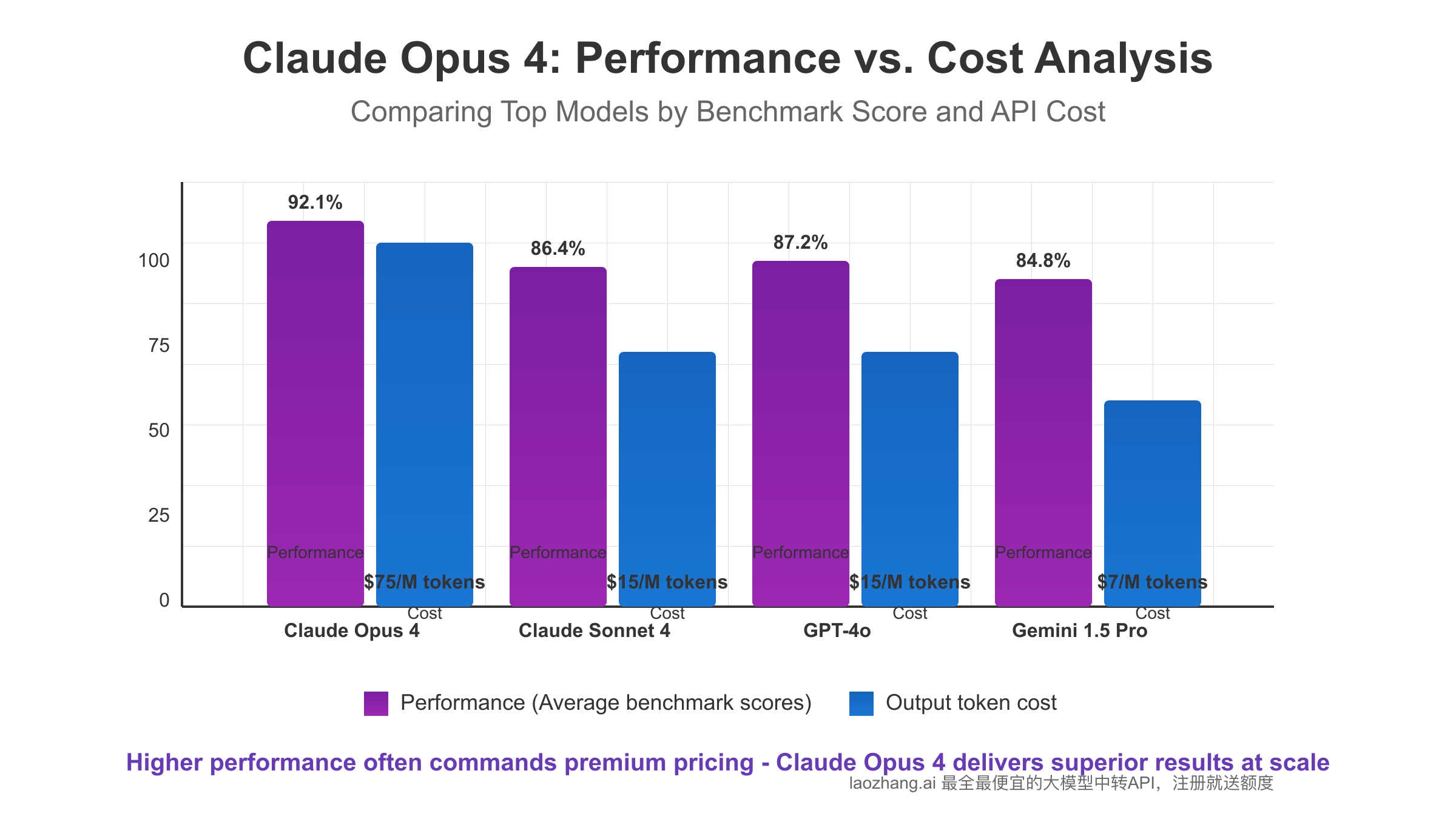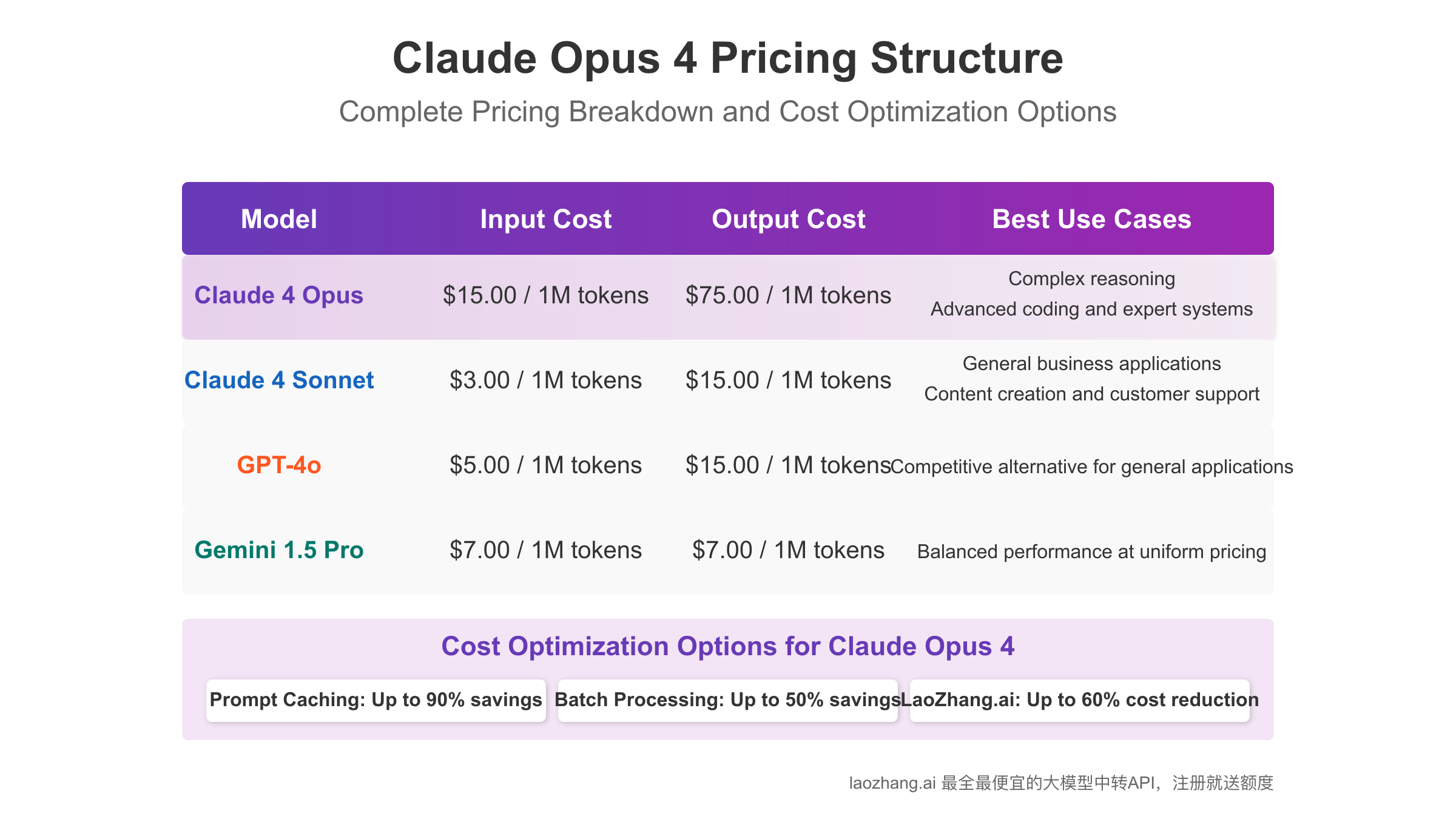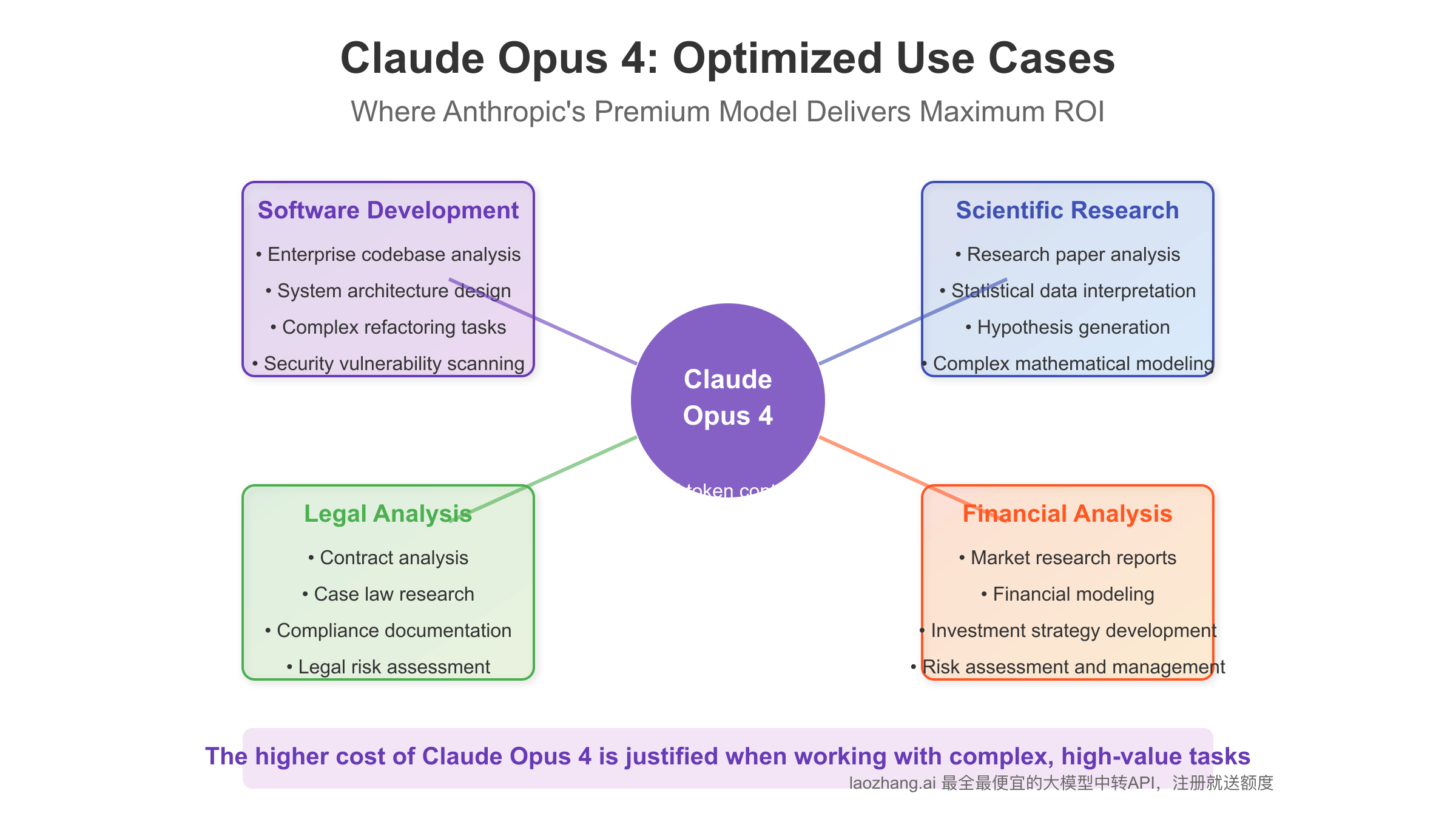In May 2025, Anthropic released Claude 4, their most advanced AI model family to date, featuring two primary variants: Opus and Sonnet. Claude Opus 4 represents Anthropic's premium offering, delivering exceptional reasoning, coding capabilities, and multimodal understanding. However, this superior performance comes with a premium price tag that requires strategic implementation for cost-effective use. This comprehensive guide analyzes Claude Opus 4's pricing structure, compares it with alternative options, and explores optimization strategies to maximize your ROI.
Claude Opus 4's pricing structure includes $15 per million input tokens and $75 per million output tokens, with substantial savings possible through optimization techniques
Understanding Claude Opus 4 Pricing Structure
Claude Opus 4 employs a token-based pricing model that distinguishes between input tokens (the content you send to the API) and output tokens (the content generated by the model). This differentiated pricing structure reflects the computational cost distribution in large language models.
The official pricing for Claude Opus 4 is:
- Input tokens: $15 per million tokens
- Output tokens: $75 per million tokens
This represents a significant premium compared to other models in the Claude family and competitors. For context, a million tokens is approximately equivalent to 750,000 words or about 3,000 pages of text. However, understanding token consumption is crucial for cost management, as tokens include not just visible text but also formatting, whitespace, and system instructions.
Cost Optimization Features
Anthropic has introduced several features to help manage Claude Opus 4's premium pricing:
-
Prompt caching: Store system prompts for up to an hour, reducing token costs by up to 90% for repetitive queries. With caching, the cached write operation costs $18.75 per million tokens, while subsequent read operations cost only $1.50 per million tokens.
-
Batch processing: Submit multiple requests simultaneously for up to 50% cost savings through optimized resource allocation.
-
Messages Context Persistence (MCP): Store conversation context server-side rather than sending it with each request, significantly reducing input token costs for multi-turn interactions.
When implementing cost optimization strategies correctly, the effective cost can be substantially lower than the headline rates, making Claude Opus 4 more accessible for appropriate use cases.
Performance vs. Cost Analysis
When evaluating Claude Opus 4's pricing, it's essential to consider the value delivered. According to Anthropic's benchmarks, Claude Opus 4 achieves industry-leading results across multiple domains:

The model excels particularly in:
- Complex reasoning tasks: 61.2% on GPQA (compared to 47.1% for GPT-4o)
- Coding challenges: 94.5% on HumanEval (compared to 89.4% for GPT-4o)
- Factual accuracy: 94.8% on TruthfulQA (compared to 90.9% for GPT-4o)
These benchmark advantages translate to real-world benefits in enterprise environments, including:
-
Superior problem-solving: Claude Opus 4 can tackle more complex reasoning challenges with fewer iterations, reducing overall token consumption and potentially lowering total cost despite higher per-token pricing.
-
Advanced coding capabilities: For software development tasks, the model generates more accurate, functional code with fewer iterations, improving developer productivity.
-
Extended context understanding: With a 1 million token context window, Claude Opus 4 can process and reason over vast documents, enabling use cases that would require multiple API calls with smaller-context models.
For high-value, complex tasks where accuracy and sophisticated reasoning are paramount, the performance premium can justify the cost premium.
Comparative Pricing Analysis
To better understand Claude Opus 4's positioning in the market, let's compare its pricing with other leading models:

Claude Opus 4 vs. Other Models
The pricing differential between Claude Opus 4 and alternatives is significant:
| Model | Input Cost (per 1M tokens) | Output Cost (per 1M tokens) | Best Use Cases |
|---|---|---|---|
| Claude 4 Opus | $15.00 | $75.00 | Complex reasoning, advanced coding, expert systems |
| Claude 4 Sonnet | $3.00 | $15.00 | General business applications, content creation, customer support |
| GPT-4o | $5.00 | $15.00 | Competitive alternative for general applications |
| Gemini 1.5 Pro | $7.00 | $7.00 | Balanced performance at uniform pricing |
Several observations emerge from this comparison:
-
Claude Opus 4 charges 5x more for input tokens and 5x more for output tokens compared to Claude Sonnet 4, reflecting its positioning as a premium offering for specialized use cases.
-
The output token cost for Claude Opus 4 ($75/M) is significantly higher than all competitors, creating a substantial cost differential for generation-heavy applications.
-
The input-to-output price ratio is unique to each provider's business model, with Anthropic charging 5x more for outputs than inputs, while Google maintains equal pricing across Gemini models.
This pricing structure signals that Claude Opus 4 is strategically positioned for high-value, reasoning-intensive tasks where the quality of outputs justifies the premium cost.
Strategic Implementation: When to Use Claude Opus 4
Given its premium pricing, Claude Opus 4 is best deployed selectively for tasks where its advanced capabilities provide substantial value. The following application categories typically justify the investment:

1. Advanced Software Development
Claude Opus 4's exceptional coding abilities make it valuable for complex software development tasks, including:
- Enterprise codebase analysis and modernization
- System architecture design and optimization
- Security vulnerability assessment
- Complex refactoring projects
- Technical documentation generation
For development teams, the model's ability to understand complex codebases and generate high-quality solutions can significantly reduce development time, potentially saving thousands of dollars in engineering hours.
2. Scientific Research
The model's reasoning capabilities make it particularly valuable for scientific and academic applications:
- Research paper analysis and literature reviews
- Statistical data interpretation
- Hypothesis generation and experimental design
- Mathematical modeling and problem-solving
For research organizations, Claude Opus 4 can accelerate discovery processes by quickly processing and synthesizing large volumes of technical literature, potentially leading to breakthrough insights.
3. Legal Analysis
Legal professionals benefit from Claude Opus 4's ability to process and reason over lengthy documents:
- Contract analysis and risk assessment
- Case law research and precedent analysis
- Compliance documentation
- Legal argument development
With its million-token context window, Claude Opus 4 can analyze entire legal agreements or case documents in a single request, providing comprehensive analysis that would require multiple iterations with smaller models.
4. Financial Analysis
The financial sector benefits from Claude Opus 4's advanced reasoning and ability to understand complex numerical relationships:
- Market research report generation
- Financial modeling and analysis
- Investment strategy development
- Risk assessment and management
Financial institutions can leverage Claude Opus 4 to process vast amounts of market data and generate sophisticated analyses that inform high-value investment decisions.
Cost Optimization Strategies for Claude Opus 4
For organizations looking to leverage Claude Opus 4 while managing costs, several optimization strategies can significantly reduce expenses:
1. Tiered Model Approach
Implement a strategic multi-model architecture:
- Use Claude Opus 4 for initial complex reasoning tasks, system design, and specialized problems
- Delegate routine follow-up tasks to Claude Sonnet 4 or Claude 3.5 Sonnet
- Handle simple, repetitive tasks with Claude 3 Haiku or other lightweight models
This approach reserves the premium model for tasks where its capabilities provide the highest value, while using more cost-effective alternatives for standard operations.
2. Prompt Engineering Optimization
Reduce token consumption through efficient prompt design:
- Structure prompts to minimize unnecessary context and maximize clarity
- Use concise instructions and limit examples to those necessary for task completion
- Leverage the Files API for document processing instead of including document text in prompts
- Implement temperature control to reduce verbosity in responses
Well-designed prompts can reduce token consumption by 30-50% without sacrificing quality, directly translating to cost savings.
3. Leverage Advanced API Features
Take advantage of Anthropic's cost-saving API features:
- Implement prompt caching for repetitive system instructions (up to 90% savings)
- Use batch processing for related queries (up to 50% savings)
- Deploy the Messages Context Persistence (MCP) connector for multi-turn conversations
- Utilize streaming responses to terminate generation early when sufficient information is received
Organizations that implement all available optimization features report overall cost reductions of 40-70% compared to naïve implementations.
4. Third-Party API Gateways
Consider accessing Claude Opus 4 through cost-effective third-party providers:
- Services like LaoZhang.ai offer access to Claude Opus 4 at up to 60% lower rates
- Many third-party providers include additional features like reliability improvements, usage analytics, and simplified billing
- Some platforms offer unified access to multiple LLMs, enabling easy A/B testing and fallback options
For many organizations, especially those with international payment challenges, third-party API gateways provide both cost advantages and convenience benefits.
Accessing Claude Opus 4 Through LaoZhang.ai
LaoZhang.ai offers a compelling alternative for accessing Claude Opus 4 at reduced rates. As a specialized API gateway service, it provides:
- Discounted pricing: Up to 60% lower rates than official Anthropic pricing
- API compatibility: Drop-in replacement for official Anthropic endpoints
- Global accessibility: Especially valuable for users in regions with payment restrictions
- Free trial credits: New accounts receive complimentary tokens for evaluation
- Simplified payment: Support for international payment methods including Alipay
The service works by aggregating demand across many users, enabling volume discounts that are passed on to customers. The API implementation is compatible with standard Anthropic client libraries, requiring minimal code changes:
pythonimport requests import json # Using LaoZhang.ai endpoint instead of Anthropic api_url = "https://api.laozhang.ai/v1/messages" api_key = "YOUR_LAOZHANG_API_KEY" # Get from laozhang.ai headers = { "Content-Type": "application/json", "Authorization": f"Bearer {api_key}" } data = { "model": "claude-4-opus", "max_tokens": 1000, "messages": [ {"role": "user", "content": "Analyze the implications of this financial report..."} ] } response = requests.post(api_url, headers=headers, data=json.dumps(data)) result = response.json() print(result["content"])
By registering at https://api.laozhang.ai/register/?aff_code=JnIT, users can access the full capabilities of Claude Opus 4 at more accessible rates. This is particularly valuable for small to medium businesses, independent developers, and organizations in regions where direct API access is challenging.
Real-World Cost Scenarios
To illustrate the practical implications of Claude Opus 4 pricing, consider these real-world scenarios:
Scenario 1: Enterprise Software Development
A development team needs to analyze and refactor a complex codebase with 100,000 lines of code:
-
Without optimization:
- Input: 250,000 tokens (~$3.75)
- Output: 50,000 tokens (~$3.75)
- Total cost: ~$7.50 per analysis session
-
With optimization (caching, MCP):
- Input: 250,000 tokens at cached rates (~$0.38)
- Output: 50,000 tokens (~$3.75)
- Total cost: ~$4.13 per session (45% savings)
-
With LaoZhang.ai:
- Approximately $3.00 per session (60% savings)
The team runs 100 such sessions monthly, making optimization and third-party access significant cost factors.
Scenario 2: Legal Document Analysis
A law firm analyzes 50-page contracts daily:
-
Without optimization:
- Input: 100,000 tokens per contract (~$1.50)
- Output: 20,000 tokens per summary (~$1.50)
- Total: $3.00 per contract
-
With batch processing and optimized prompts:
- Input: 80,000 tokens (~$1.20)
- Output: 15,000 tokens (~$1.13)
- Total: $2.33 per contract (22% savings)
Across hundreds of contracts monthly, these savings quickly accumulate.
Scenario 3: Research Organization
A research institute processes scientific papers:
-
Standard approach:
- 50 papers daily at ~$5.00 per paper
- Monthly cost: ~$7,500
-
With full optimization suite:
- Cost per paper reduced to ~$2.00
- Monthly cost: ~$3,000 (60% savings)
These scenarios demonstrate that while Claude Opus 4's base pricing is premium, careful implementation and strategic access methods can significantly reduce effective costs.
Making the Decision: Is Claude Opus 4 Worth the Price?
The decision to use Claude Opus 4 should be based on a careful value assessment:
-
Task complexity: For straightforward tasks, more affordable models like Claude Sonnet 4 or GPT-4o may be sufficient. Reserve Opus for truly complex reasoning, coding, or specialized tasks.
-
Value of accuracy: In domains where errors are costly (legal, financial, healthcare), Claude Opus 4's superior performance may justify its premium price.
-
Iteration requirements: If tasks typically require multiple iterations with less capable models, Opus might solve problems in fewer attempts, potentially reducing overall costs.
-
Context needs: For applications requiring the full 1M token context window, Claude Opus 4 offers unique capabilities that justify its pricing.
-
Implementation strategy: Consider whether your team has the expertise to implement cost optimization strategies effectively.
Many organizations find that a hybrid approach—using Claude Opus 4 selectively for high-value tasks while leveraging more affordable alternatives for routine operations—provides the optimal balance of capability and cost.
Conclusion: Balancing Premium Performance with Practical Economics
Claude Opus 4 represents the pinnacle of Anthropic's AI capabilities, offering industry-leading performance across reasoning, coding, and document understanding tasks. While its pricing reflects this premium positioning, strategic implementation and optimization can significantly reduce costs, making it accessible for high-value applications.
For organizations requiring maximum AI performance in complex domains, Claude Opus 4 delivers substantial value despite its premium pricing. By implementing the optimization strategies outlined in this guide and considering alternative access methods like LaoZhang.ai, you can harness Claude Opus 4's exceptional capabilities while maintaining budget discipline.
Whether you're developing sophisticated software, analyzing complex legal documents, conducting scientific research, or performing detailed financial analysis, Claude Opus 4 offers capabilities that can transform your workflows—if implemented strategically and cost-effectively.
For the most affordable access to Claude Opus 4 and other leading AI models, register at LaoZhang.ai and receive free trial credits to experience the full capabilities before committing to larger investments. The future of AI is powerful, but it doesn't need to be prohibitively expensive.
